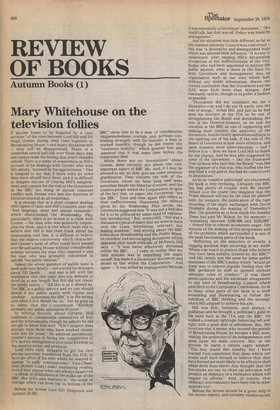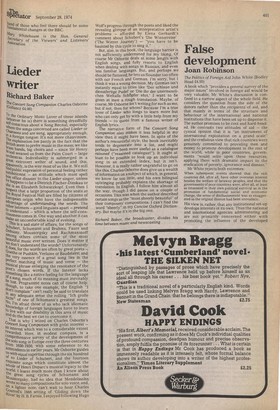REVIEW OF BOOKS
Autumn Books (1)
Mary Whitehouse on the television follies
If anyone hopes to be beguiled by a racy accounts of the rows between Lord Hill and Sir Hugh Greene during their time together at Broadcasting House and many doubtless will they will be disappointed. There is a somewhat unreal pall laid over those days, and one cannot resist the feeling that much remains untold. There is a sense of evasiveness in Hill's account of his dealings with Greene who was, Hill admits, "stunned by his appointment." One is tempted. to say that if there were no rows then there should have been, and it is difficult to imagine anyone of Charles Hill's temperament and concern for the role of the Governors at the BBC not being in almost constant conflict with Greene who saw the function of Director-General as all-important.
It is strange that in a short chapter dealing With lapses of taste and Hill's concern over the "foul language, smut and sexual innuendo" which characterised the Wednesday Play particularly, there is no record of a clash with Greene the man who was primarily responsible for them, and it is this which leads one to believe that Hill is less than frank about his relationship with him. It is difficult to believe that the endless controversy which characterised Greene's term of office could have passed over Broadcasting House without considerable polemic between the man who inspired it and the man who was primarily concerned to uphold "the public interest."
Indeed the whole question of public taste is dealt with very briefly not a word for instance about Till Death . . . and one is left with the impression that this topic was too delicate to dwell on at any length. But Hill did not resent the public outcry "All this is as it should be. The BBC is a public service and no one should demur if the public reacts with vigour and candour. ... sometimes the BBC is in the wrong and when it is it should say so," but he goes on to admit that the Corporation "disliked intensely any public admission of error."
In writing directly about Greene, Hill confesses to considerable admiration of him and his achievements though he admits he did not get to know him well. "Nor I suspect does anyone, even those who have worked closely with him for years." He admired enormously Greene's success in facing the competition of ITV and his willingness to give total freedom to the creative writer and producer. Lord Hill's early struggles to get his own private secretary transferred from the ITA, to have an office of his own where he wanted it, against "a sadly contemptuous" Vice-Chairman (Robert Lusty) make interesting reading even if they expose what one always suspected -a streak of childishness in the make-up of the BBC. But Hill's own reaction to "the sense of outrage which ran from top to bottom of the Behind the Screen Lord Hill (Sidgwick and Jackson £5.50) BBC" show him to be a man of considerable singlemindedness, courage, and, perhaps contrasting strangely with his manner, a man of marked humility, though he did resent the "courteous hostility" which greeted him and admitted that it was some time before the resentment died.
While there are no 'revelations' about Greene, there certainly are about one very important aspect of BBC life. And, if I may be allowed to say so, they give me some personal gratification. They concern the role of the Governors, whom we have long said were powerless beside the Director-General, and the. creative people within the Corporation.. in spite of the fact that, on paper, the Governors "are the BBC." Time and time again Hill refers to their ineffectiveness. Discussing the offence given by the Wednesday Play series, the Governors suggested that "it was not a bad idea for it to be prefaced by some kind of explanatory introduction." But, writes Hill, "this was a discussion typical of many that we were to have over _the years, interesting, relevant, but leading nowhere." And writing about the BBC publication Broadcasting and the Public Mood,, an excellent and encouraging document which appeared after much criticism of 24 Hours, Hill says "It was never effectively discussed within the BBC. . . . I came to realise that my fatal mistake was in redrafting the paper myself: this made it a Governors' document and sealed its fate within the Corporation." And again "it was stifled by management because it was essentially a Governors' document." "We could talk, but that was all. Policy was made by management."
And the situation was little different as far as the General Advisory Council was concerned this was "a decorative and distinguished body which was allowed little influence." It is easy to understand, after reading Hill's devastating revelations of the ineffectiveness of the very bodies who had been appointed to protect the public interest, what a thorn in the flesh for both Governors and management was an organisation such as our own which had, without any inside information, drawn the correct conclusion that the Governors and the GAC were little more than stooges. And constantly said so, though in as polite a fashion as possible.
"Providence did not construct me for a decorative role and I do not fit easily into the role of stooge," writes Hill, and just as he had seen his function at the ITA to be one of strengthening the Board and diminishing the role of the Director-General, so he saw his vocation at the BBC as one of supporting and making more realistic the authority of the Governors. And he clearly spared himself little in the carrying out of his task. If the role of the Board of Governors is now more effective, and upon occasion more interventionist -` and I believe it is then we have Lord Hill to thank for the change. And he was ably supported by some of the Governors like the frustrated Tom Jackson who said that the Board "was like the organiser of a bus trip, who staffed the bus and filled it with petrol, but had no control over its destination."
As far as 'senstive politicians' are concerned, the book is very revealing. Certainly the BBC has had plenty of trouble with Mr Harold Wilson over the years! One imagines that the Prime Minister will not be the least bit pleased with, for instance, the publication of the tape recording of his angry exchanges with David Dimbleby during the making of Yesterday's Men. The question as to how much the Sunday Times had paid Mr Wilson for his memoirs "something between £100,000 and £250,000" roused him to almost incoherent anger. The account of the making of this programme and all the problems which surrounded it is one of the most fascinating parts of the book.
"Reflecting on the sequence or events, a nagging question kept recurring in my mind. Whose role was it to protect those who believe they have been unfairly treated by the BBC?" And Hill clearly saw the need for some public statement of the BBC's policy which -would go some way to remove popular feeling that the BBC permitted its staff to operate without adequate rules of conduct." It was these preoccupations and his wholesale antagonism to any kind of Broadcasting Council which gave birth to the Complaints Commission. As in so many other parts of the book is is both interesting and illuminating to follow the subtleties of BBC thinking and the strategy which Hill adopted to achieve his aim.
Hill was first, foremost, and always, a politician and he brought a politician's guile to his work both at the ITA and the BBC. He walked a constant tightrope, balancing left and right with a good deal of adroitness. But, like everyone else, it seems, who crossed the portals of Broadcasting House, he became a BBC man, making the protection of its independence and good name his main concern. But, in the process, he learnt a certain cagey wisdom. "This may sound like timidity but I have learned from experience that ideas which our senior staff have formed or believe that they have formed are more likely to be effective than °biter dicta from above. Any thought that the Governors are out to clean up television will produce an obduracy or a resistance which will negate. its efforts." And, of course, that obduracy and resistance have been felt in other quarters too!
Behind the Screen should be a great help to the Annan inquiry, and certainly reinforces the
l;land of those who feel there should be some ondatnental changes at the BBC.
24,.,arY Whitehouse is the Hon. General Secretary of the Viewers' and Listeners' Association



































 Previous page
Previous page